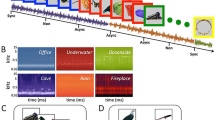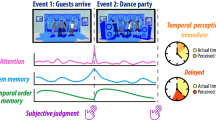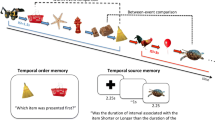Summary
Several observations from everyday life suggest that people are deficient in monitoring their own actions, often forgetting that they have already performed a planned act, or experiencing doubt as to whether they have done so. These observations appear inconsistent with the many laboratory studies that indicate that people are quite efficient in monitoring their own actions. Towards the resolution of this discrepancy we proposed that: (a) output monitoring in real life often requires the retrieval of a specific, contextually framed episode rather than mere familiarity with an event, and (b) output events are less strongly integrated with their environmental contexts than input events are. Therefore, despite the output advantage that is frequently reported in occurrence memory, context memory should be relatively less efficient for output than for input events. This hypothesis received some support in Experiment 1, in which generated verbal responses were remembered better than read responses, but the difference was significantly smaller for context than for occurrence memory. Experiment 2 employed a task simulating a two-person interaction. While occurrence memory was superior for self-performed tasks to that for other-performed tasks, context memory was in fact inferior for the former tasks. These results were seen to suggest that self-initiated actions tend to undergo a weaker contextual integration than events that originate from a source external to the person.
Similar content being viewed by others
References
Anderson, R. E. (1984). Did I do it or did I only imagine doing it?Journal of Experimental Psychology: General, 113, 594–613.
Backman, L., & Nilsson, L.-G. (1984). Aging effects in free recall: An exception to the rule.Human Learning, 3, 53–69.
Backman, L., Nilsson, L.-G., & Chalom, D. (1986). New evidence on the nature of the encoding of action events.Memory & Cognition, 14, 339–346.
Baddeley, A. D. (1982). Domains of recollection.Psychological Review, 89, 708–729.
Banaji, M. R., & Crowder, R. G. (1989). The bankruptcy of everyday memory.American Psychologist, 44, 1185–1193.
Begg, I., Snider, A., Foley, F., & Goddard, R. (1989). The generation effect is no artifact: Generating makes words distinctive.Journal of Experimental Psychology: Learning, Memory, and Cognition, 15, 977–989.
Brewer, W. F. (1988). Memory for randomly sampled autobiographical events. In U. Neisser, & E. Winograd (Eds.),Remembering reconsidered: Ecological and traditional approaches to the study of memory (pp. 21–90). Cambridge: Cambridge University Press.
Cohen, R. L. (1981). On the generality of some memory laws.Scandinavian Journal of Psychology, 22, 267–281.
Cohen, R. L. (1983). The effect of encoding variables on the free recall of words and action events.Memory & Cognition, 11, 575–582.
Craik, F. I. M. (1989). On the making of episodes. In H. L. Roediger, III & F. I. M. Craik (Eds.),Varieties of memory and consciousness: Essays in honour of Endel Tulving (pp. 43–57). Hillsdale: Erlbaum.
Engelkamp, J. (1986). Nouns and verbs in paired-associate learning: Instructional effects.Psychological Research, 48, 153–159.
Engelkamp, J. (1990). Memory of action events: Some implications for memory theory and for imagery. In C. Cornoldi & M. McDaniel (Eds.),Imagery and cognition. New York: Springer.
Engelkamp, J., & Zimmer, H. D. (1984). Motor programme information as a separable memory unit.Psychological Research, 46, 283–299.
Engelkamp, J., Zimmer, H. D., & Denis, M. (1989). Paired associate learning of action verbs with visual- or motor-imaginal encoding instructions.Psychological Research, 50, 257–263.
Gardiner, J. M., Passmore, C., Herriot, P., & Klee, H. (1977). Memory for remembered events: Effects of response mode and response-produced feedback.Journal of Verbal Learning and Verbal Behavior, 16, 45–54.
Hasher, L., & Zacks, R. T. (1979). Automatic and effortful processes in memory.Journal of Experimental Psychology: General, 108, 356–388.
Helstrup, T. (1986). Separate memory laws for recall of performed acts?Scandinavian Journal of Psychology, 27, 1–29.
Helstrup, T. (1987). One, two, or three memories? A problem-solving approach to memory for performed acts.Acta Psychologica, 66, 37–68.
Helstrup, T. (1989). Loci for act recall: Contextual influence on the processing of action events.Psychological Research, 51, 168–175.
Hirshman, E., & Bjork, R. A. (1988). The generation effect: Support for a two-factor theory.Journal of Experimental Psychology: Learning, Memory, and Cognition, 14, 484–494.
Johnson, M. K. (1988). Reality monitoring: an experimental phenomenological approach.Journal of Experimental Psychology: General, 117, 390–394.
Kanwisher, N. G. (1987). Repetition blindness: Type recognition without token individuation.Cognition, 27, 117–143.
Kausler, D. H., & Hakami, M. K. (1983). Memory for activities: Adult age differences and intentionality.Developmental Psychology, 19, 889–894.
Kausler, D. H., Mein, D. M., & Overcast, T. D. (1975). Item recognition following a multiple item study for young and middle-aged adults.Experimental Aging Research, 71, 243–250.
Koriat, A., & Ben-Zur, H. (1988). Remembering that I did it: Processes and deficits in output monitoring. In M. M. Gruneberg, P. E. Morris, & R. N. Sykes (Eds.),Practical aspects of memory: Current research and issues, Vol. 1 (pp. 203–208). Chichester: Wiley and Sons.
Koriat, A., Ben-Zur, H., & Sheffer, D. (1988). Telling the same story twice: Output monitoring and age.Journal of Memory and Language, 27, 23–39.
Lewin, K. (1951).Field theory in social science. New York: Harper & Row.
Mandler, G. (1980). Recognizing: The judgment of previous occurrence.Psychological Review, 87, 252–271.
McCormak, P. D. (1984). Temporal coding by young and elderly adults in a list-differentiation setting.Bulletin of The Psychonomic Society, 22, 401–402.
McDaniel, M. A., Waddill, P. J., & Einstein, G. O. (1988). A contextual account of the generation effect: A three-factor theory.Journal of Memory and Language, 27, 521–536.
Neisser, U. (1978). Memory: What are the important questions? In M. M. Gruneberg, P. E. Morris, & R. N. Sykes (Eds.),Practical aspects of memory (pp. 3–24). London: Academic Press.
Neisser, U. (1988). Time present and time past. In M. M. Gruneberg, P. E. Morris, & R. N. Sykes (Eds.),Practical aspects of memory: Current research and issues, Vol. 2 (pp. 545–560). Chichester: Wiley and Sons.
Nilsson, L.-G., & Cohen, R. L. (1988). Enrichment and generation in the recall of enacted and non-enacted instructions, In M. M. Gruneberg, P. E. Morris, & R. N. Sykes (Eds.),Practical aspects of memory: Current research and issues, Vol. 1 (pp. 427–432). Chichester: Wiley and Sons.
Rapoport, J. L. (1989). The biology of obsessions and compulsions.Scientific American, 260, 63–69.
Reason, J. (1983). Lapses of attention in everyday life. In W. Parasuraman, D. Davis, & J. Beatty (Eds.),Aspects of consciousness, Vol. 1 (pp. 515–549). London: Academic Press.
Reed, G. F. (1985).Obsessional experience and compulsive behavior: A cognitive-structural approach. Orlando: Academic Press.
Sher, K. J., Frost, R. O., & Otto, R. (1983). Cognitive deficits in compulsive checkers: an exploratory study.Behavior Research Therapy, 21, 357–363.
Slamecka, N. J., & Graf, P. (1978). The generation effect: Delineation of a phenomenon.Journal of Experimental Psychology: Human Learning and Memory, 4, 592–604.
Slamecka, N. J., & Katsaib, K. T. (1987). The generation effect as an artifact of selective displaced rehearsal.Journal of Memory and Language, 26,589–607.
Tulving, E. (1985). How many memory systems are there?American Psychologist, 40, 385–398.
Zimmer, H. D., & Engelkamp, J. (1989). Does motor encoding enhance relational information?Psychological Research, 51, 158–167.
Author information
Authors and Affiliations
Rights and permissions
About this article
Cite this article
Koriat, A., Ben-Zur, H. & Druch, A. The contextualization of input and output events in memory. Psychol. Res 53, 260–270 (1991). https://doi.org/10.1007/BF00941396
Issue Date:
DOI: https://doi.org/10.1007/BF00941396




